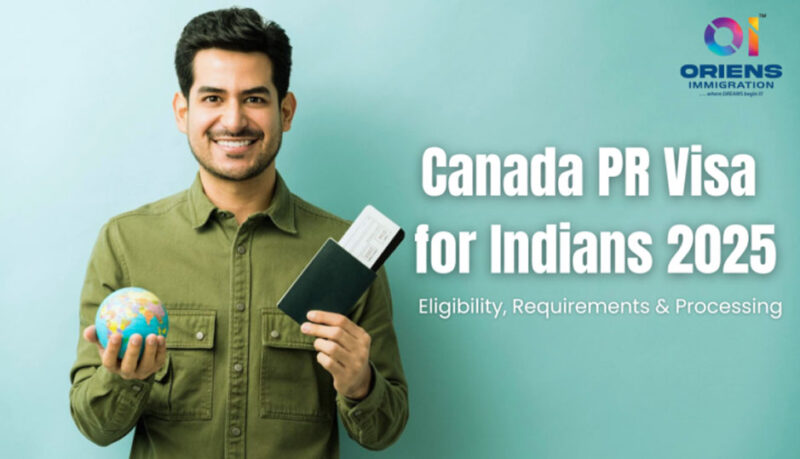Navigating the Canadian immigration process can feel overwhelming—but with the right information and preparation, thousands of Indian professionals and families successfully move to Canada every year. Whether you’re a skilled worker, student, or someone looking to build a life abroad, understanding how to apply for Canada PR (Permanent Residency) from India in 2025 is your first crucial step.
What is Canada PR and Why is It in High Demand?
Canada Permanent Residency (PR) allows foreign nationals to live, work, and settle in Canada with almost all the rights of a citizen (except voting). Indian applicants remain one of the largest immigrant groups due to Canada’s quality of life, healthcare, education, and career opportunities.
Why Is It in High Demand?
Canada PR is one of the most sought-after immigration programs globally, especially among Indians, for the following reasons:
✅ Strong Job Market – Canada actively seeks skilled professionals to fill labor shortages across tech, healthcare, construction, and more.
✅ Transparent Immigration System – Programs like Express Entry and Provincial Nominee Program (PNP) make the process faster and merit-based.
✅ Family-Friendly – You can sponsor your spouse, children, and even parents once you become a PR holder.
✅ Education & Healthcare – Free public schooling and universal healthcare add to the appeal for families.
✅ Path to Citizenship – After meeting residency requirements, PR holders can apply for Canadian citizenship in as little as 3 years.
Canada PR Pathways for Indians in 2025
Indian professionals seeking to settle in Canada have two primary immigration pathways to Permanent Residency (PR): Express Entry and the Provincial Nominee Program (PNP). Both options present strong opportunities based on individual profiles and goals.
✳1. Express Entry Canada (EE)
This is the fastest and most popular route for skilled workers. Express Entry is an online, points-based immigration system that manages applications under three federal programs:
- Federal Skilled Worker (FSW):For professionals with overseas work experience and education.
- Federal Skilled Trades (FST):Tailored for technical trades and skilled labor roles.
- Canadian Experience Class (CEC):For those with Canadian work or study experience.
Express Entry applicants are ranked using the Comprehensive Ranking System (CRS). Profiles with higher CRS scores receive Invitations to Apply (ITAs) during regular IRCC draws.
✳ 2. Provincial Nominee Program (PNP)
Each Canadian province has its own PNP streams, allowing it to nominate candidates based on local labor market needs. PNP is ideal if your CRS score is lower but your job profile is in-demand in a specific province (e.g., Ontario, Alberta, Saskatchewan).
A PNP nomination adds 600 CRS points to your Express Entry profile—almost guaranteeing an ITA.
Canada PR Eligibility for Indian Applicants
You must meet the following minimum criteria under the Federal Skilled Worker Program:
| Eligibility Factor | Minimum Requirement |
| Age | Preferably under 45 (highest points for 20–29) |
| Education | Post-secondary degree (ECA needed) |
| Work Experience | At least 1 year full-time in NOC TEER 0, 1, 2, or 3 |
| Language Proficiency | IELTS/CELPIP score equivalent to CLB 7 or above |
| Proof of Funds | CAD 14,690 (for 1 person) as of 2025 update |
Note: Requirements vary for PNPs and CEC. Use the Immigration Points Calculator to assess your score.
Immigration Points Calculator: What CRS Score Do You Need?
To succeed in Express Entry, your profile is scored out of 1200 points based on the CRS system. As of 2025, a competitive score for Indian applicants is 490 or higher.
CRS Factors That Matter Most:
- Age:20–29 gets maximum points
- Education:Higher degrees = more points
- Work Experience:Canadian and foreign both count
- Spouse Factors:Their language skills and education matter
- Language Test Results:IELTS or CELPIP (aim for CLB 9 or above)
- Provincial Nomination:+600 points
- Job Offer (Optional):+50 to +200 points depending on NOC level
✅ Quick Tip: Use the official Canada Immigration Points Calculator to estimate your CRS score and adjust your profile strategically before applying.
Required Documents for Canada PR in 2025
Before applying for Canada Permanent Residency (PR), Indian applicants must gather and verify several key documents. Incomplete or outdated paperwork is one of the most common reasons for delays or rejections. Here’s what you’ll typically need in 2025:
- Valid Passport:The document must be current and have at least six months of validity.
- Educational Credential Assessment (ECA):Issued by WES or another IRCC-approved body to validate your foreign education.
- Language Proficiency Test (IELTS or CELPIP):Mandatory for Express Entry; aim for a CLB 7 or higher.
- Work Experience Letters:It must include your job duties, pay scale, and tenure, matching your NOC code.
- Proof of Funds:As per 2025 requirements (CAD 14,690 for a single applicant); must be recent and liquid.
- Police Clearance Certificate (PCC):From every country you’ve lived in for 6+ months after age 18.
- Medical Exam Records:Conducted by an IRCC-approved panel physician.
- Digital Photo & Biometrics:Required post-ITA (Invitation to Apply); biometric validity is 10 years.
Tip: Double-check formatting and submission rules on the IRCC portal. Minor errors can cause major delays.
Canada PR Processing Time (2025 Update)
| Pathway | Estimated Time |
| Express Entry | 6–10 months |
| PNP (Base Stream) | 12–18 months |
| CEC (Post-study) | 4–6 months |
Pain Point: Applications with incomplete documents or unclear job descriptions face major delays. Always match your job role to the correct NOC code.
Canadian Work Permit vs. PR: What’s the Difference?
Understanding the distinction between a Canadian work permit and Permanent Residency (PR) is crucial before planning your career abroad:
| Type | Work Permit | Permanent Residency (PR) |
| Validity | Temporary (1–4 years) | Permanent (renewable every 5 years) |
| Employer Bound? | Yes – usually tied to a specific employer | No – freedom to work anywhere in Canada |
| PR Pathway | May lead to PR (e.g., via CEC or PNP) | Already includes PR right |
| Dependents | May need separate authorization | Can sponsor spouse/children easily |
💡 If your long-term goal is to settle in Canada, applying directly for PR offers more flexibility and stability than a temporary work permit.
Canadian Citizenship Application: What Comes After PR?
Once you’ve held Canada PR status for a few years, you may be eligible to become a full Canadian citizen.
Eligibility Criteria for Indian PR Holders:
- Residency:You must live in Canada for at least 1,095 days (3 years) within the last 5 years.
- Language:Prove proficiency in English or French (CLB 4+).
- Taxes:You should have filed taxes for at least 3 years during your PR stay.
- Test & Interview:You’ll take a written test on Canadian rights, responsibilities, history, and values.
Canadian citizenship allows you to vote, obtain a Canadian passport, and enjoy full mobility rights—not to mention security for your family’s future.
Wrapping Up
Applying for Canada PR from India in 2025 is achievable—but only when you choose the right path and prepare thoroughly. Express Entry and PNP continue to be the most accessible routes for skilled Indians.
Common Pitfalls to Avoid:
- Inaccurate job code (NOC mismatch)
- Low IELTS/CELPIP score dragging the CRS down
- Missing proof of funds or expired PCC
- Applying without understanding the full PR process
Partnering with an experienced immigration consultant or visa expert can reduce risks and give you an edge in the pool.
Frequently Asked Questions (FAQs)
Q1. Is a job offer from India required for Canada PR?
No. A job offer adds 50–200 points but is not mandatory under Express Entry.
Q2. What’s the best age to apply for Canada PR?
Ages 20–29 receive maximum CRS points. Over 40? You’ll need a strong education, work experience, and language scores.
Q3. Which is better: IELTS or CELPIP for Canada PR?
Both are accepted. IELTS is more widely recognized in India, while CELPIP might be easier for some test-takers due to their familiarity with the Canadian accent.
Q4. Can I apply for Canada PR while living in India?
Yes. The full Express Entry process is online and accessible globally.
Q5. How do I increase my CRS score?
- Improve IELTS/CELPIP score
- Apply for PNP
- Add spouse qualifications
- Gain more work experience.
Q6. What if my application is rejected?
You can reapply after fixing the issue. IRCC typically provides a reason for refusal.



